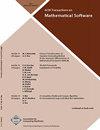hIPPYlib-MUQ: A Bayesian Inference Software Framework for Integration of Data with Complex Predictive Models under Uncertainty
IF 3.2
1区 数学
Q2 COMPUTER SCIENCE, SOFTWARE ENGINEERING
引用次数: 13
Abstract
Bayesian inference provides a systematic framework for integration of data with mathematical models to quantify the uncertainty in the solution of the inverse problem. However, the solution of Bayesian inverse problems governed by complex forward models described by partial differential equations (PDEs) remains prohibitive with black-box Markov chain Monte Carlo (MCMC) methods. We present hIPPYlib-MUQ, an extensible and scalable software framework that contains implementations of state-of-the art algorithms aimed to overcome the challenges of high-dimensional, PDE-constrained Bayesian inverse problems. These algorithms accelerate MCMC sampling by exploiting the geometry and intrinsic low-dimensionality of parameter space via derivative information and low rank approximation. The software integrates two complementary open-source software packages, hIPPYlib and MUQ. hIPPYlib solves PDE-constrained inverse problems using automatically-generated adjoint-based derivatives, but it lacks full Bayesian capabilities. MUQ provides a spectrum of powerful Bayesian inversion models and algorithms, but expects forward models to come equipped with gradients and Hessians to permit large-scale solution. By combining these two complementary libraries, we created a robust, scalable, and efficient software framework that realizes the benefits of each and allows us to tackle complex large-scale Bayesian inverse problems across a broad spectrum of scientific and engineering disciplines. To illustrate the capabilities of hIPPYlib-MUQ, we present a comparison of a number of MCMC methods available in the integrated software on several high-dimensional Bayesian inverse problems. These include problems characterized by both linear and nonlinear PDEs, various noise models, and different parameter dimensions. The results demonstrate that large (∼ 50×) speedups over conventional black box and gradient-based MCMC algorithms can be obtained by exploiting Hessian information (from the log-posterior), underscoring the power of the integrated hIPPYlib-MUQ framework.hipylib - muq:一种用于不确定性下复杂预测模型数据集成的贝叶斯推理软件框架
贝叶斯推理为数据与数学模型的集成提供了一个系统框架,以量化反问题解中的不确定性。然而,由偏微分方程(PDEs)描述的复杂正演模型控制的贝叶斯反问题的解仍然是黑盒马尔可夫链蒙特卡罗(MCMC)方法所禁止的。我们提出了hIPPYlib-MUQ,这是一个可扩展和可扩展的软件框架,包含了旨在克服高维、pde约束的贝叶斯逆问题挑战的最先进算法的实现。这些算法通过导数信息和低秩近似,利用参数空间的几何特性和固有的低维性,加快了MCMC采样速度。该软件集成了两个互补的开源软件包,hIPPYlib和MUQ。hipylib使用自动生成的基于伴随导数的导数来解决pde约束的逆问题,但它缺乏完整的贝叶斯功能。MUQ提供了一系列强大的贝叶斯反演模型和算法,但希望正演模型配备梯度和Hessians,以允许大规模解决。通过结合这两个互补的库,我们创建了一个健壮的、可伸缩的、高效的软件框架,它实现了每个库的优点,并允许我们在广泛的科学和工程学科范围内处理复杂的大规模贝叶斯反问题。为了说明hipylib - muq的功能,我们对几个高维贝叶斯反问题的集成软件中可用的一些MCMC方法进行了比较。这些问题包括线性和非线性偏微分方程、各种噪声模型和不同的参数尺寸。结果表明,通过利用Hessian信息(来自对数后验),可以获得比传统黑盒和基于梯度的MCMC算法大(~ 50倍)的加速,强调了集成hipylib - muq框架的强大功能。
本文章由计算机程序翻译,如有差异,请以英文原文为准。
求助全文
约1分钟内获得全文
求助全文
来源期刊

ACM Transactions on Mathematical Software
工程技术-计算机:软件工程
CiteScore
5.00
自引率
3.70%
发文量
50
审稿时长
>12 weeks
期刊介绍:
As a scientific journal, ACM Transactions on Mathematical Software (TOMS) documents the theoretical underpinnings of numeric, symbolic, algebraic, and geometric computing applications. It focuses on analysis and construction of algorithms and programs, and the interaction of programs and architecture. Algorithms documented in TOMS are available as the Collected Algorithms of the ACM at calgo.acm.org.
 求助内容:
求助内容: 应助结果提醒方式:
应助结果提醒方式:


